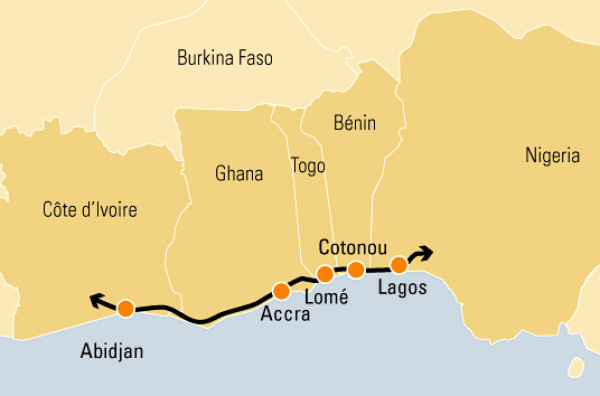West African nations are working towards constructing a major highway network that would connect five countries, namely the Ivory Coast, Ghana, Togo, Benin, and Nigeria. This project, which is being championed by the African Development Bank, is expected to be a significant economic engine for all the countries involved. The highway infrastructure development would help in the transportation of goods and services across the West African nations, leading to economic integration, internal trade, and poverty reduction. The road-based trade corridors would also help in the maintenance of peace and stability in the region. The proposed highway network would be part of the larger trans-African highway system, which is aimed at improving connectivity and efficiency in intra-African trade and transit.
The Abidjan-Lagos Corridor project is a six-lane dual carriage highway that is approximately 1,080 km long. It will connect some of the largest and most economically dynamic cities in West Africa, such as Abidjan, Accra, Cotonou, Lomé, and Lagos. The corridor will also link vibrant seaports in West Africa and serve all the landlocked ECOWAS member-states, such as Burkina Faso, Mali, and Niger. Nearly 40 million people are estimated to be living along the Abidjan-Lagos corridor, while 47 million people travel along the axis every year. These are expected to be direct beneficiaries of the development of the project, which is touted to be a real backbone of trade in the region.
The highway project falls in line with the key objectives of the ECOWAS Vision 2050, including facilitating the movement of people and goods and accelerating trade and transport, regional and international, improving road infrastructure. It is expected that the transport corridor will be transformed into a development corridor to stimulate investment, sustainable development, and poverty reduction within the entire region.
The feasibility and preliminary designs studies have been completed, and the final phases are expected to be completed before the end of the year. The detailed design studies have been completed, and the scope of financing has been determined. The project is estimated to cost US$15.1 billion, and the African Development Bank (AfDB) on behalf of the development partners offered its assurance for unwavering commitment to the realization of the highway.
The Abidjan-Lagos Corridor Highway Development Project is being implemented not only as a road project but also as an integrated ‘development corridor’ that will catalyze the deployment of other important sectors such as industry, agriculture, energy, environment, and tourism in the region, becoming an economic corridor to boost the growth of the region.
The project has faced financing challenges, and the ECOWAS had adopted a new regulatory framework on the Public-Private Partnership (PPP) to incentivize the entry of the private sector in large investments like the nature of this project. The African Development Bank (AfDB) on behalf of the development partners offered its assurance for unwavering commitment to the realization of the highway.
The Abidjan-Lagos Corridor Highway Development Project is expected to ease the free movement of people, goods, and services, generate social and economic activities, and ultimately promote cross-border trade within the region, its economic viability, and enormous potentials, especially now that the African Union looks to implement the African Continental Free Trade Area (AfCFTA).


